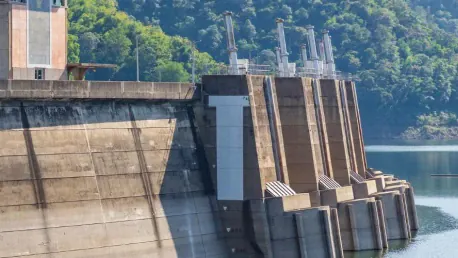In a significant financial move, Saudi Arabia has pledged $100 million from its Development Fund towards the completion of the Rogun Hydropower Plant (HPP) in Tajikistan, a project that underscores Tajikistan’s strategic priorities in energy and economic development. This funding announcement was made by Saudi Arabia’s Ambassador to Tajikistan, Walid bin Abdulrahman Al-Rashidan, during a recent press event. With its completion anticipated to enhance regional electricity production, the Rogun HPP is viewed as a pivotal component in bolstering Tajikistan’s energy security and economic standing.
Regional Impact and Energy Security
Enhancing Electricity Production and Exports
The Rogun HPP is poised to be a cornerstone of Tajikistan’s energy infrastructure. The plant, when fully operational, is expected to not only meet domestic needs but also significantly boost electricity exports to neighboring Central Asian countries. With an estimated overall project cost of $6.4 billion, approximately 70% of the generated power from Rogun HPP is earmarked for export, reflecting Tajikistan’s ambition to become a key energy supplier in the region. This move is anticipated to usher in a new era of economic growth and regional influence for the nation, leveraging its natural hydropower resources to enhance both domestic and neighboring electricity grids.
Furthermore, the strategic importance of the Rogun HPP extends beyond mere electricity generation. By harnessing its hydropower potential, Tajikistan aims to fortify its energy security, reducing its reliance on external energy sources and stabilizing its domestic power supply. The increased electricity production will provide a reliable energy base for industrial growth and modernization efforts within the country, fostering economic resilience. As Central Asia continues to modernize, the demand for stable and sustainable energy sources grows, positioning Tajikistan to play a crucial role in the region’s future energy landscape.
Strategic Importance for Economic Development
The Rogun HPP not only serves as a key energy project but also symbolizes broader economic aspirations for Tajikistan. The successful completion of this hydropower plant is expected to catalyze significant economic benefits, including job creation, improved infrastructure, and enhanced foreign investment. The project is poised to become a magnet for international stakeholders who are keen on exploring investment opportunities in Tajikistan’s growing energy sector.
However, while the Rogun HPP promises substantial economic rewards, it also introduces complex financial dynamics. The high costs associated with completing the project could strain Tajikistan’s national budget, potentially diverting funds away from other critical infrastructure initiatives and social programs. A report by the Eurasian Fund for Stabilization and Development (EFSD) highlights these fiscal concerns, suggesting that additional budgetary support from international financial organizations may be necessary starting in 2025. The report underscores the importance of sustained international collaboration to ensure the project’s financial viability without compromising the nation’s broader economic stability.
Financial and Economic Considerations
Financial Implications for Tajikistan
The financial landscape surrounding the Rogun HPP is marked by significant challenges and uncertainties. With the overall project completion cost estimated at $6.4 billion, the Tajik government faces the daunting task of managing substantial expenditures while safeguarding fiscal stability. Increased costs of hydropower construction have the potential to strain the national budget, putting pressure on public finances and possibly requiring reallocations from other important sectors.
The EFSD report sheds light on the critical need for enhanced financial oversight and international support to mitigate these risks. According to the report, Tajikistan may require additional budgetary assistance from global financial institutions starting in 2025 to cover any unforeseen funding gaps and ensure the project’s seamless progression. Securing further fiscal aid could help prevent disruptions in the completion timeline and uphold the ambitious goals set for the Rogun HPP.
Broader Economic Consequences
In a notable financial development, Saudi Arabia has committed $100 million from its Development Fund to help complete the Rogun Hydropower Plant (HPP) in Tajikistan. This substantial investment highlights Tajikistan’s strategic focus on energy and economic growth. The announcement of this funding was made by Saudi Arabia’s Ambassador to Tajikistan, Walid bin Abdulrahman Al-Rashidan, at a recent press event. The completion of the Rogun HPP is not just a significant step for Tajikistan but also has broader implications for the region’s electricity production. Expected to substantially increase the local power supply, the plant is considered a crucial element in securing Tajikistan’s energy future and enhancing its economic status. By addressing energy shortages, the Rogun HPP will also support industrial and economic activities, making it a key asset in the country’s development. This initiative reflects Saudi Arabia’s growing role in international energy projects and underscores its commitment to fostering economic collaborations.









